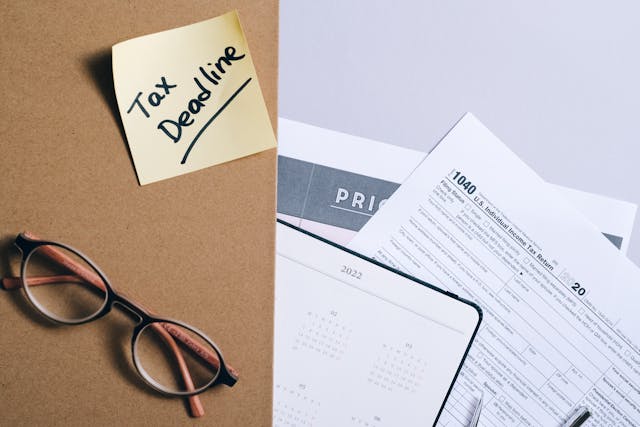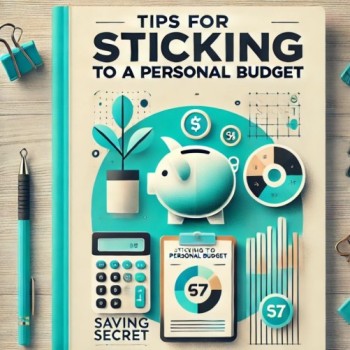Tips for Sticking to a Personal Budget: Creating a personal budget is an important step towards financial security, but sticking to it is frequently the most difficult issue. Whether you’re saving for a specific goal or attempting to get out of debt, sticking to a budget is critical. In this complete guide, we’ll look at practical techniques for keeping to a personal budget, ensuring you keep control of your spending while accomplishing your goals.

Why Sticking to a Budget Matters
A personal budget acts as a road map for your financial future. It enables you to properly manage your money, prevent needless costs, and prioritise your financial objectives. Here’s why sticking to a budget is important:
Financial Stability: A budget guarantees that you live within your means, lowering the danger of debt.
Goal Achievement: Whether you’re purchasing a house, saving for retirement, or planning a trip, a budget keeps you on track.
Reduced Stress: Knowing that your finances are in order may greatly reduce money-related stress.
1. Establish clear financial goals
Why It is Important:
Setting precise goals provides your budget meaning and direction. Without specific goals, it is easy to lose motivation.

How To Do It:
- Define short-term objectives (such as saving for a new phone) and long-term goals (such as purchasing a home).
- Make your goals SMART (specific, measurable, attainable, relevant, and time-bound).
- Break down huge ambitions into smaller, more doable benchmarks.
Instead of saying “I want to save money,” say, “I will save $5,000 in one year for a vacation.”
2. Keep track of your spending
Why It is Important:
Tracking your spending allows you to see where your money is going and discover opportunities for improvement.
How To Do It:
- Use budgeting programs such as Mint, YNAB, and PocketGuard.
- Maintain a daily cost record in a notebook or spreadsheet.
- Review your spending patterns on a regular basis to make necessary budget adjustments.
Tip: To identify discretionary spending, divide costs into fixed (e.g., rent) and variable (e.g., dining out).
3. Create a Realistic Budget Why It’s Important
A budget that’s too restrictive can be difficult to follow and may lead to burnout or overspending.

How to Do It:
Use the 50/30/20 rule: Allocate 50% of your income to needs, 30% to wants, and 20% to savings or debt repayment. Include a “fun money” category to allow for occasional indulgences. Adjust your budget based on your income and lifestyle.
Pro Tip: Start with a basic budget and refine it as you gain more insight into your spending habits.
4. Automate Your Finances Why It’s Important
Automating your finances lowers the chance of missing payments and guarantees steady progress towards your financial objectives.
How to Do It:
- Schedule debt repayments to coincide with your paydays
- Put in place automatic transfers to investment or savings accounts
- Use auto pay for bills to prevent late fees
Pro Tip: Automate emergency fund contributions to create a safety net.
5. Reduce Needless Spending
The Significance of It:
Spending less on unnecessary items frees up funds for debt reduction and savings.
How to Complete It:
- Terminate any unneeded memberships or subscriptions.
- Make meals at home rather than going out to dine.
- Seek out cashback offers, coupons, or discounts.
Pro Tip: To find and cut off unnecessary spending, perform a monthly expenditure audit.
6. Make Discretionary Purchases Using Cash
The Significance of It:
By restricting your spending to what you have on hand, paying with cash helps you stay within your budget.

How to Complete It:
- Take out a certain amount of money per week for personal use.
- Employ the envelope system: Put money into envelopes designated for particular uses (e.g., entertainment, grocery).
Pro Tip: To prevent impulsive purchases, leave credit cards at home.
7. Establish an Emergency Fund
The Significance of It:
Having an emergency reserve keeps unforeseen costs from throwing your budget off course.
How to Complete It:
- Begin modestly: First, aim for $500 to $1,000.
- Increase the money gradually until it covers three to six months’ worth of living expenditures.
- Store the money in a different, conveniently accessible account.
Pro Tip: Consider emergency fund payments to be non-negotiable costs.
8. Regularly Review and Modify Your Budget
The Significance of It:
Your budget should adapt to the changes in your life. Frequent evaluations guarantee that your budget stays applicable and efficient.
How to Complete It:
- Remind yourself to evaluate your budget once a month.
- Make adjustments for shifts in income, spending, or financial objectives.
- Reward minor victories to keep yourself inspired.
Pro Tip: Make use of a budgeting program that offers optimisation insights and recommendations.
9. Refrain from Spending Emotionally
The Significance of It:
Your budget may be disrupted and unforeseen costs may result from emotional spending.
How to Complete It:
- Determine what causes emotional spending, such as boredom or tension.
- Create healthy coping strategies, such as writing, meditation, or physical activity.
- Establish a cooling-off period for purchases that are not absolutely necessary.
Pro Tip: Don’t aimlessly browse internet stores; instead, follow your purchasing list.
10. Engage Partners in Accountability
The Significance of It:
Accountability and support are increased when you discuss your financial objectives with a trusted individual.
How to Complete It:
- Talk to a spouse, family member, or friend about your financial objectives.
- For inspiration and guidance, join forums or communities focused on budgeting.
- Think about collaborating with a financial adviser or coach.
Pro Tip: To keep yourself motivated, keep your accountability partner informed about your progress on a regular basis.
11. Give yourself a treat for reaching milestones
The Significance of It:
Honouring accomplishments keeps you inspired and strengthens sound financial practices.
How to Complete It:
- Establish clear goals, such saving a set amount of money or paying off a credit card.
- Give yourself inexpensive pleasures, such as a day out or your favourite food.
Pro Tip: To prevent overpaying, make sure rewards are inside your budget.
12. Become knowledgeable about finances
The Significance of It:
You can make wise selections and stay within your budget if you have a solid understanding of personal finance.

How to Complete It:
- Take online classes or read books about money management and budgeting.
- Keep up with YouTube channels, podcasts, and blogs about personal finance.
- Attend financial literacy lectures or workshops.
Pro Tip: Make the most of your knowledge to improve your financial and budgetary tactics.
13. Adopt a frugal lifestyle
The Importance of It:
Being frugal is making deliberate decisions to optimise value rather than depriving oneself.
How to Complete It:
- To save money on necessities, use deals or used goods.
- Reuse things rather than purchasing new ones.
- Prioritise experiences above material belongings.
Pro Tip: For ideas and advice, join groups devoted to economical living.
14. Create Visual Goal Reminders
The Importance of It:
Visual clues encourage you to stay inside your budget and help you remember your financial objectives.
How to Complete It:
- Make a vision board with pictures that symbolise your objectives.
- To visualise your debt payments or savings, use financial progress trackers.
- Put goal reminders in places where others may see them, like your desk or refrigerator.
Pro Tip: To show progress and rekindle passion, update your images frequently.
15. Develop Your Ability to Say No
The Significance of It:
Adhering to a budget requires learning to say no to wasteful spending.

How to Complete It:
- Refuse invitations or events that are out of your price range politely.
- By concentrating on your financial priorities, you may resist peer pressure.
- When making significant purchases, practise delaying pleasure.
Pro Tip: Present saying “no” as a constructive decision that will help you reach your objectives.
Final Thoughts
Maintaining a personal budget involves self-control, persistence, and a thorough comprehension of your financial objectives. You can take charge of your money, lessen stress, and attain long-term stability by putting these suggestions into practice. Keep in mind that a budget is a tool to help you become more financially independent, not to limit you.
Visit SavingSecret.in for further tools and advice, and get started on the path to better money management right now.
FAQs
1. How can I maintain a budget when my income fluctuates?
Prioritise your most important costs, then save during months with high incomes to create a cushion.
2. If I spend too much in one area, what should I do?
To make up for the overspending, reallocate money from other areas of your budget.
3. Can I budget for entertainment expenses?
Yes, set aside a certain amount for entertainment so that you may have fun without going over your budget.
4. How frequently should my budget be reviewed?
Make sure your budget is in line with your objectives and present financial status by reviewing it every month.
5. Can I change my financial objectives?
Of course! Objectives should be adaptable to shifting priorities or conditions.
How to Build Your First Budget in 5 Simple Steps
